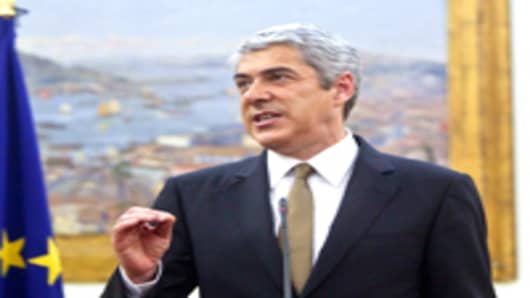Portugal goes to the polls on Sunday looking to elect a government that will lead them through an austerity package mandated by the European Union and International Monetary fund; but whoever wins will need to defy the electorate and introduce unpopular policies.
The country's government collapsed when Jose Socrates, the socialist prime minister, resigned after parliament rejected an austerity plan aimed at staving off a bailout. The opposition Social Democrats (PSD), who had largely been supportive of austerity up until that point, instead called for an election.
The PSD is now edging ahead in the polls, but that Socrates' socialists are still in the running highlights the lack of distance between the two parties' policies, analysts told CNBC.com.
"The opposition has tacitly supported the socialists over the last two years, they've abstained from voting on a number of policies, they've agreed to austerity, except to the final package that collapsed the government," IHS Global Insight analyst Dragana Ignjatovic told CNBC.com.
"So I think there's less policy differentiation between the parties and the opposition hasn't tried to capitalize on the economic situation as much as has been seen in other countries, such as Spain," Ignjatovic said.
In May, the country agreed a 78 billion euros ($113 billion) financing package with the IMF and EU.
Both the socialists and the PSD have accepted that this austerity package is inevitable and have broadly agreed on its implementation, Ignjatovic said.
Resistance to Liberalization
While this political consistency could be encouraging for investors as the country looks to implement harsh austerity measures, the lack of divergence between the political parties also means that they share a resistance to liberalization, at least in their rhetoric, Luis Faria, president of the Contraditorio think tank in Lisbon, told CNBC.com.
"Portugal… has great difficulty in dealing with political messages with the word liberalization," Faria said.
"Even PSD, with their new leader Pedro Passos Coehlo, introduced a new message in the political spectrum in Portugal. They are more liberal than previous leaders were, but they always emphasize that they are not a liberal party and they will not liberalize, for example, the labor market. They will introduce more flexibility, and they explain that it's a very different thing," he said.
Messages centering on social inclusion and protection resonate far more, Faria explained.
"If you have a social message emphasizing the importance of social policies, that is a message that the electorate will support, and the prime minister, Socrates, he is trying to pass the message of 'this is not our fault, this is all about the international crisis, and the socialist party will continue to defend those who need it most," he said.
The bad news is, analysts say, that liberalizing the labor market, improving the clarity of tax rules and other politically difficult measures would be a key part of modernizing the Portuguese economy, making it more competitive and stimulating growth.
The government retains golden shares in a lot of key industries, and is seen as being tied closely to big business, where liberalization and full privatization has not historically been countenanced.
"Portugal has a very complex tax system, it's not particularly business friendly. Over the past six or seven years there have been vast numbers of changes, tweaks here, tweaks there, which in and of themselves would not be too substantial, but they just keep making changes… The vast number of tweaks has made it highly unpredictable, which acts as a disincentive," IHS Global Insight's Ignjatovic said.
"(Reform) needs to be handled very carefully, the socialists kind of tip-toed around it, there's only so long that they can keep doing that. Even Spain is addressing its inflexible labor market," he added.
Faria said that any government will need to be "courageous" if it wants to pull the country out of its economic decline.
"When PSD assumes its ideological option for these elections, and is more liberal than the socialists… we can expect something good from that program. But the two most used words in the program are 'support' and 'stimulus'. It's a very conditional liberalism," Faria explained.
"It's not easy to pass a liberal message in Portugal, but that is the inevitable way that Portugal has to go," he said. "My opinion is that neither the socialists nor the social democrats will have the ability to do it."


